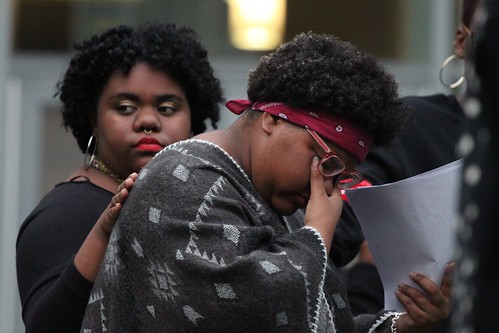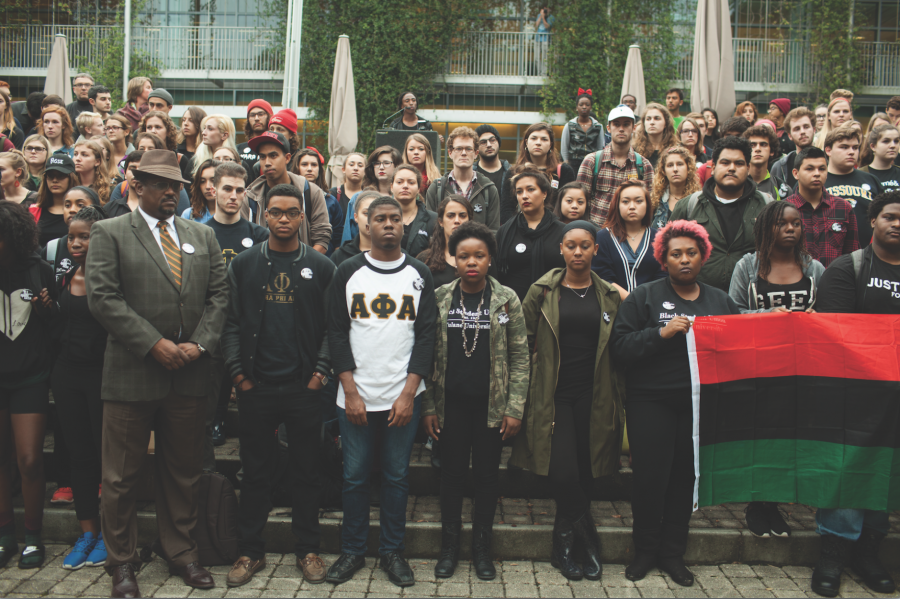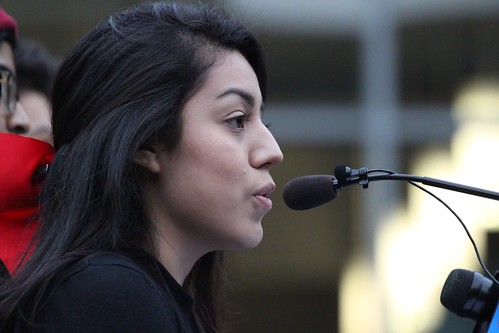Black students, allies demand racial equality
Members of the Tulane community stand on the steps outside the Lavin-Bernick Center at the Call for Unity rally 4 p.m. Wednesday in Pocket Park.
As administrators across the country at schools like the University of Missouri and Claremont McKenna are stepping down, Tulane University students are standing up.
Tulane Black Student Union and Students Organizing Against Racism hosted a Call for Unity to address the experiences of black students and other students of color with racism in the Tulane community. More than 350 students gathered for the rally at 4 p.m. Wednesday in Pocket Park outside the Lavin-Bernick Center.
“I’ve been here 31, 32 years and [I’ve] never seen this kind of cooperation and collaboration,” Assistant Vice President for Student Affairs Carolyn Barber-Pierre said.
Senior Ryan Hitchens presented opening remarks at the rally, mentioning Tulane in context of other universities at which events centered around race have recently occurred.
“The intent of this dialogue is to prompt a response that will bridge the gap between the university and black students,” said during the event. “We stand with black student activists and their allies across the nation at University of Missouri, Yale University, Princeton University, NYU and other institutions. We stand with these students that are committed to making institutions of higher learning more equitable for all marginalized groups.”
At the rally, tBSU and SOAR announced a List of Demands, which included wanting President Michael Fitts to call for the Tulane administration to make their institution a safe space for minority populations.
“After the recent and continuous events of racism, microaggresions, marginalization and the general neglect of black students on Tulane’s campus, Tulane’s Black Student Union with the help and support [of] Students Organizing Against Racism has come up with the following condensed list of demands to be immediately addressed by President Michael Fitts and his administration,” junior and tBSU Vice President for Programming Alex Williams said before reading the demands.

William Potts | Photo Editor
Alex Williams (left) and Mykia Kidd react to speeches at the Call for Unity rally 4 p.m. Wednesday in Pocket Park. The event included speakers from Tulane Black Student Union and Students Organizing Against Racism, among others.
This is not the first time the Tulane black community has presented demands to the school’s administration. On Aug. 23, 1968, the African-American Congress of Tulane, an African-American rights organization on campus, developed an agenda called the “Order of Discourse” that contained demands for the university to address its own systemic racism.
The first item on tBSU’s and SOAR’s list presented on Wednesday calls for the administration to meet the demands from 1968.
The demands from 1968 called for more black faculty, funds for a black cultural center and a minimum of 100 black students per new freshman class. In 2015, 212 of Tulane’s 6394 full-time undergraduates are African-American, making up 3 percent of the population, according to the Tulane University Registrar.
“That activism [from 1968] eventually turned into what became the Office of Multicultural Affairs, but the O is severely underfunded,” Williams said. “We have a ridiculously small space. There aren’t enough staff members here.”
Other student organizations that focus on race spoke at the rally in solidarity with black students. Students representing Muslim, Latino and white students expressed their commitment to join with other students to change the systems that propel racism within the Tulane community.
“Because of the different manifestations of racism across nonwhite groups, historically there has been division across all races,” said junior Ana De Santiago, Generating Excellence Now and Tomorrow in Education co-president. “Only in recognizing these differences can we truly begin to understand and dismantle the way racism operates in conjunction with white supremacy.”
President Fitts spoke twice at the Call for Unity. He addressed posts on the anonymous social media site Yik Yak regarding race in his “The View from Gibson” on Friday. The same email previewed the Call for Unity.
“It was very clear that there are a number of students who feel deeply pained by their experiences here at Tulane and have experienced racist comments and really not feel welcome and respected here,” Fitts said in an interview after the address. “I applaud the incredible passion and dedication and they did a phenomenal job of not only bringing the students here, but articulating the need for Tulane to be more welcoming and supportive of all students.”
William Potts | Photo Editor
Ana De Santiago, co-president of GENTE, speaks on immigration at the Call for Unity rally 4 p.m. Wednesday in Pocket Park.
For senior Rachel Clayton, the timing of this event, in the wake of anti-racism demonstrations across the country, and the failure of past attempts at change, have created concerns about following through with action.
“I think there’s going to be change and I don’t think it’s going to happen tomorrow,” Clayton said. “I feel like we’re going to wait it out. … The truth is this is only being addressed in the wake of what’s happening at Mizzou. I doubt if otherwise you’d be standing here today. So I’m scared that it’s much like everything fizzles out; like Ferguson blows over; like Trayvon Martin blows over.”
Despite attempts at change in the past that have left minority students still unsatisfied and wary, students and administrators alike signaled that hope can be found in a resolute commitment of the community members to work together to “dismantle racism.”
“There are other institutions who are a lot further because they’ve made the commitment, they’ve really sat down and listened,” Barber-Pierre said. “I just think we’ve got a ways to go. We’ve got some work to do. If we can do it collaboratively, I think we’re going to move a lot quicker. We’re going to move in a lot more efficient way than we’ve done in the past.”
The Undergraduate Student Government passed a resolution affirming the work that tBSU and SOAR have done and the necessity of this work on campus.
The demands presented at the Call for Unity and a petition are available online.
As Tulane’s minority students stand in solidarity with each other, they recognize that they also stand in solidarity with those who came before them and those who will follow. As they echo the demands from 1968, they continue a fight that began long before their time — a fight they hope they will finish.
“This isn’t a one day thing,” Santiago said. “It’s a process, a healing process for students of color, for black students, a process of starting conversation that can change the way we treat each other at Tulane.”
Associate News Editor Alexa Christianson and Senior Staff Reporter David Preda contributed to this report.
Your donation will support the student journalists of Tulane University. Your contribution will allow us to purchase equipment and cover our annual website hosting costs.




